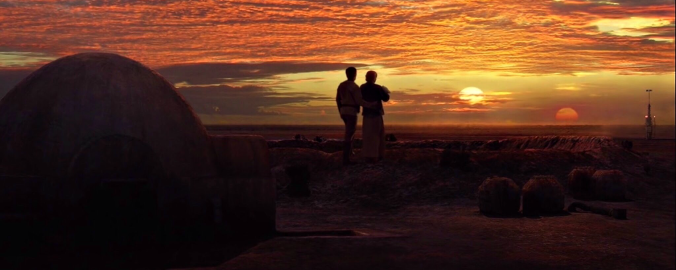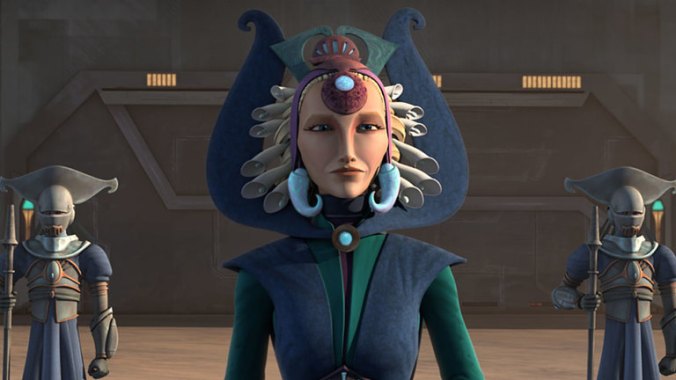Star Wars, for all its appeal and adult fans, is a story for children. It’s a fairytale with operatic overtones. Secret relatives abound, bad choices are very poorly thought out, actions have repercussions that reverberate through out the galaxy, dialogue can be stilted, emoting is big, the effects are always over the top, and ultimately the ending is never too harsh.
Bittersweet is the word that has always defined the ethos of Star Wars. The fall to the Dark Side might be tragic, the losses might be immense, but there’s a light at the end of the tunnel. We see that over and over again.
The Empire Strikes Back had the first mixed ending, but even it was upbeat. Luke lost and hand and gained an evil relative but ended the movie with his friends at his side, staring out into the distance, determined to rescue Han and save the galaxy. We know he’s going to win, as people promised a trilogy do. It’s a shocking loss but not a permanent one. By Return of the Jedi he’s more jaded, his father dead and his path cloudy. We see him lighting a funeral pyre and walking away, back to his sister and the jubilant Rebellion. Leia and Han go through a similar arc of confusion and then reciprocation and joy. It’s a soft revelation, filmed in the intimate night instead of the bright daylight and wide spaces that defined the ending scene of A New Hope, and therefore it’s more measured. The happiness and hope for the future remains.
The prequels are more bleak, designed to mirror and subvert the architecture of the original trilogy. Attack of the Clones ends with a fruitless and morally ambiguous war and a marriage doomed to failure. Objectively it’s a good ending, the bitter undertones come from hindsight and closer observation. Revenge of the Sith is a blatant tragedy, as everything comes crashing down. However, even it makes a point to end on the suns of Tatooine and the hope for the future.
Star Wars has never been about tragedy, it’s been about hope in even the bleakest of times. Rogue One, the latest Star Wars movie, is a prime example. Everyone in that movie dies! But it still makes a point to make a hopeful story out of their deaths, and to push the Rebellion forward through their sacrifice.
With this precedent, I’m a little confused by all the articles insisting Star Wars Rebels is “building up to a major tragedy” or the many opinion pieces about how Kanan and Ezra absolutely need to die. Don’t get me wrong, I like a good sacrifice as much as the next viewer, but needless death isn’t the Star Wars way. When it comes to main characters, the Han Solos and Ashokas of the world, deaths need to mean something. More than that, there needs to be a dose of hope.
Speaking of Ahsoka, it’s important to remember that Star Wars animation has neglected to kill off leading inconvenient Jedi in the past. Ahsoka was once the target of the tragedy articles as well, people were convinced she was going to die before or during Order 66. At the time it seemed logical, The Clone Wars was the most adult series on, she was a Jedi in the line of fire, and it felt like a good sacrifice. What they underestimated was the hope factor. Instead of dying, Ahsoka left the Order, walked away into the sunset and lived to see more animated series. She may or may not be an owl at the moment.
In short, there are a lot of ways to escape the death sentence of being a Jedi. More than that, there’s no reason that “hard hitting” and “ending” have to equal a blood bath or some big disaster. Even if one does come to pass, it will be a motivation for the Rebellion to grow, a driving force for survivors, and a way to expand Star Wars lore.
There’s no point to making four seasons of a show just so you can drop a bunch of rocks on the main characters heads and let Thrawn kick back and relax. We already had our big dramatic loss of the series last season (and even that had a hopeful note in the continued defiance of the Bendu, the muster of Clan Wren, and Commander Sato’s sacrifice). There’s no point in another.
I’m not sure what’s going to happen as Season 4 draws to a close. I suspect it will be big and flashy (and unfortunately I do worry Kanan will die). I’m almost certain it will involve the living essence of the Force and Lothal in some mystical capacity. What I do know is that however it ends, it won’t be gratuitously sad or gory. That’s for other shows. This is Star Wars. If there’s going to be a dose of the bittersweet stuff, we’re going to get CGI Princess Leia, or Ahsoka walking away dramatically, or a shared moment of determination and comfort at the end. That’s the important part. The tragedy is great and all, but it’s the twin suns at the end that really make it count.


